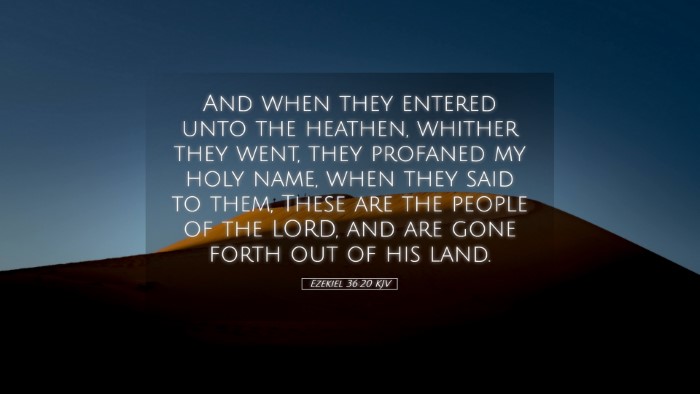Ezekiel 36:20 Commentary
Bible Verse: “And when they entered unto the heathen, whither they went, they profaned my holy name, when they said to them, These are the people of the LORD, and are gone forth out of his land.” - Ezekiel 36:20
Introduction
The book of Ezekiel represents a vital narrative filled with prophetic messages intended for the nation of Israel, particularly during their exile. In Ezekiel 36, the Lord speaks through the prophet to address the disgrace experienced by the people due to their disobedience and the resulting consequences that sparked divine judgment. This commentary will delve into the nuances of Ezekiel 36:20 using insights from notable public domain commentators such as Matthew Henry, Albert Barnes, and Adam Clarke.
Contextual Background
Ezekiel, a priest and prophet, was taken captive during the Babylonian exile. He was called to proclaim God’s judgment and restoration, often using vivid imagery and stark contrasts between the holiness of God and the sinfulness of Israel. The surrounding verses in Ezekiel 36 pave the way for understanding the thematic elements of redemption and the sanctification of God’s name.
Insights from Matthew Henry
Matthew Henry discusses the significance of God's name and the implications of its profanation by the Israelites. He emphasizes that the people had misrepresented the character of God among the nations. Their sinful actions and conduct brought shame not only upon themselves but also on God. Henry argues that it is crucial for believers to walk in a manner consistent with their calling, as their behavior reflects on God’s reputation.
Observations from Albert Barnes
Albert Barnes elaborates on the circumstances surrounding Israel's departure from their land. He outlines how the acceptance of their idolatrous practices led to their eventual exile and how this provoked the nations around them. Barnes points out that their worse condition was not merely a physical displacement but also a spiritual one, leading to the profaning of God’s name among the Gentiles. He stresses the importance of restoration and implies that a return to fidelity will lead to an exaltation of God’s name among the nations.
Analysis by Adam Clarke
Adam Clarke contributes profound theological insights regarding the nature of God's covenant with Israel. He notes that the act of profaning God’s name is linked to the perceptions and interpretations held by the surrounding nations. Clarke indicates that when Israel is perceived as forsaken and scattered, it gives rise to contempt for God Himself. He urges a deep understanding of the covenant relationship, highlighting that God's glory is intertwined with the faithfulness of His people. The restoration of Israel will not only redeem them but reclaim the sanctity of God's name among the nations.
Theological Implications
- God’s Holiness: The core issue in this verse revolves around the holiness of God's name which must not be tarnished by human conduct.
- God’s Reputation: The relationship between divine identity and human action remains crucial; believers are ambassadors of God’s nature and character.
- Call to Restoration: The promise of restoration implies an opportunity for redemption and transformation, emphasizing the hope in God’s future plans for His people.
Application for Believers
This verse serves as a serious reminder for contemporary believers regarding their role in representing Christ in a world that often views Christian witness through the lens of personal integrity and communal conduct. Each action of a believer can either glorify or profane the name of God, making it imperative to live in a way that honors His character.
Practical Reflections:
- Examine Conduct: Regular self-examination and repentance are vital in ensuring alignment with God’s character.
- Understand Community Impact: Recognize that the collective behavior of Christians bears witness to the world about God’s nature.
- Respond to Restoration: Embrace the call to participate in God’s restorative work in the world.
Conclusion
Ezekiel 36:20 reflects a deep tension between God’s expectations of His people and their failure to uphold His name among the nations. Through the insights gleaned from public domain commentaries, we see a tri-fold challenge: to comprehend the holiness of God, to appreciate the consequences of human actions, and to embrace the hope of restoration. For pastors, students, theologians, and scholars, this passage encourages a profound consideration of how believers can embody and reflect God’s character in all aspects of life, ensuring that His name is honored and glorified.


